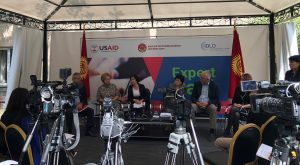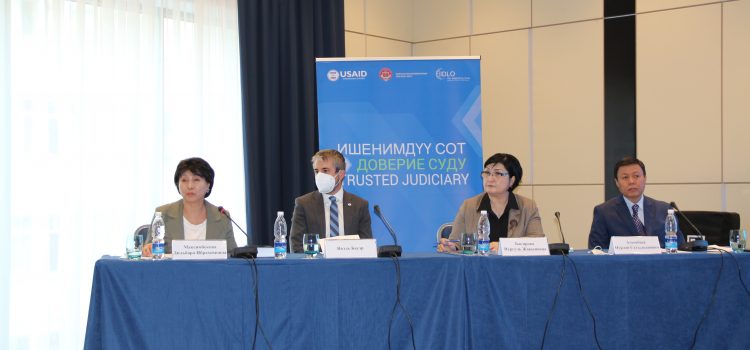On September 28, 2021, the official closing of the USAID-IDLO Trusted Judiciary program took place in Bishkek. Participants were welcomed by USAID Democracy and Governance Division Director Noel Bauer and President of the Supreme Court of the Kyrgyz Republic Nurgul Bakirova.
Director of the IDLO branch in the Kyrgyz Republic Dilbar Maksimbekova outlined the key program achievements for 2011-2021.
Thus, during the project period, assistance was provided in the development and promotion of the I (2014-2017) and II (2019-2022) State Target Program (STP) for the development of the judicial system.
This strategic document, adopted with the agreement of all branches of government, provides for an increase in the financing of the judiciary, improvement of the infrastructure of buildings, development of vocational training, wage increases, and the introduction of digital technologies.
Digitalization of the judicial system
According to IDLO consultant in the Kyrgyz Republic Viktor Albrecht, program support in the digitalization of the judicial system was built taking into account an integrated approach.
“Firstly, this is the development of plans for digitalization, the relevant areas and budget were fixed in STP1 and STP2 and detailed in the Strategic plans for the development of information technologies for 2014-2018 and 2019-2022. Secondly, the program provided organizational technical assistance: it helped to establish the Adilet Sot Information Technology Institution and the Data Processing Center to implement and service the IT needs of the judiciary. Thirdly, the program helped expand and modernize the network and communication infrastructure of the courts and purchase part of the computer equipment. It should be emphasized that the purchase of AVT equipment and the introduction of digital technologies were carried out at the expense of the state budget. Fourthly, the Software Assistance made it possible to develop and implement software in key areas:
- E-Court: An electronic document management system was developed and implemented in the SC of the KR, case and legal proceedings systems in the SC of the KR, which improve the processes of case management and documentation.
- Register of Acts: The Program supported the development of the site http://www.act.sot.kg and its expansion to a full-featured system “State Register of Judicial Acts”. Today, almost 90% of all decisions are published on this public resource, which allows the public to see the quality and validity of court decisions.
Currently, a contextual keyword search has been launched in test mode, which will allow you to search or summarize identical judicial acts on this site. The updated system will automatically depersonalize and publish judicial acts in the State Register of Judicial Acts. (Except for those whose publication is not provided for by law).
The participants of the final presentation were able to see on the demo screen how the system automatically depersonalizes and publishes judicial acts in the State Register of Judicial Acts.
Demonstration of new technologies
The participants were presented with an apparatus for remote interrogation of a witness. The compact device will allow remote interrogation of the witness during the trial. This method of interrogation may be necessary if the personal presence of a witness in court is associated with certain risks. Employees of the PEC “Adilet sot” demonstrated in real-time how to conduct a remote interrogation, while there are functions that allow you to hide your face, and change the voice of a witness during remote interrogation.
The next system that is being introduced to increase the transparency and accountability of the judiciary is the audio and video recording system (AVT).
This system allows you to draw up the minutes of the court session with the greatest accuracy, thereby preventing possible violations and corruption.
To introduce new technologies, employees of the judicial system were trained, and assistance was provided in changing the legislative framework.
Analysis of judicial acts based on open data
With the support of the program, Methodological recommendations for the generalization of judicial practice in Russian and Kyrgyz languages were developed and approved by the Supreme Court of the Kyrgyz Republic. This allowed the legal community to analyze judicial acts, including using the data posted on the act.sot.kg website.
- Civil legal community carried out:
10 analyzes of judicial acts in civil, criminal cases, and tax disputes,
- Judges from the regions conducted a generalization of judicial practice in cases of establishing legal facts and crimes against sexual integrity.
- The Association of Lawyers of Kyrgyzstan and the Association of Markets, Trade and Services Enterprises of Kyrgyzstan analyzed the problems of participation of government agencies in litigation.
The programmatic work on the digitalization of the judicial system was awarded the prestigious DIGITAL DEVELOPMENT AWARDS.
Professional development of judges
With the support of the Program, a platform has been created for the systematic, continuous professional development of judges and court staff.
According to the director of the Higher School of Law Elmira Baitikova, with program support, it was possible to introduce a comprehensive training program for current and newly appointed judges.
The USAID-IDLO program, together with the Higher School of Justice, conducted a pilot mentoring project this year. In seven courts of the republic, 26 mentors were distributed, which were qualified judges, as well as ex-judges.
How to file a claim?
With program support, a Directory of Documents Required for Filing a Statement of Claim with a Court in Civil, Economic and Administrative Cases has been published.
The handbook published in Kyrgyz and Russian languages can be used by judges, lawyers, prosecutors, students, teachers of higher educational institutions, practicing lawyers, and citizens who apply to the courts to protect their rights, freedoms, and legally protected interests. This, in turn, facilitates citizens’ access to justice.
Enhancement of legal education
The program helps to improve the system of legal education. The Moot Court Course was introduced in six universities across the country. Annual inter-university competitions in drafting judicial acts and conducting a trial have improved the quality of legal education in the country.
Information work

The program supported initiatives aimed at informing the public about the activities of the judiciary.
- During the project period, 12 episodes of the legal TV program “Achyk Aikyn” were launched in Kyrgyz and Russian languages, which were broadcast on KTRK and regional TV channels.
- Platforms Expert cafe, Danaker talkuu were created to discuss legal topics
- Trained judges and press secretaries of the judiciary on interaction with media representatives.
Decrease in violence in society
Sharing the values underlying the global action “16 Days of Activism Against Gender Violence”, the Program supported activities aimed at raising the legal awareness of young people and reducing violence in society.
Thus, from November 25 to December 10, with the support of USAID and IDLO, within the framework of the Trusted Judiciary program, in partnership with the Supreme Court of the Kyrgyz Republic and the Association of Legal Clinics, the action “There is no justification for violence” was held.
This action was timed to coincide with the global campaign “16 days of activism against gender-based violence”. Seven student teams interviewed 917 respondents and developed social videos based on the information they collected. All videos were posted in the public domain on the Instagram platform under the single hashtags #ZombuluktuAktaba #JashtarTendikUchun. The students’ videos have received more than 15,000 views.
From February 25 to April 8, 2020, a large-scale republican competition among schoolchildren of Kyrgyzstan “There is no excuse for violence” was held, which was organized by the ALE “Association of Legal Clinics of Kyrgyzstan” with the support of the USAID-IDLO Trusted Judiciary program in partnership with the Ministry of Education and Science of the Kyrgyz Republic.
As part of the competition, with the involvement of lawyers and experts, online seminars were held for participants on the topic: “What is gender and family violence and how to deal with it?”.
In the course of a large-scale online survey on gender-based violence, the participating teams interviewed 12,411 respondents throughout the country and, based on the information collected, prepared 145 social videos that received massive support from youth and society through youtube platform, the total views of which exceeded 120,000.




